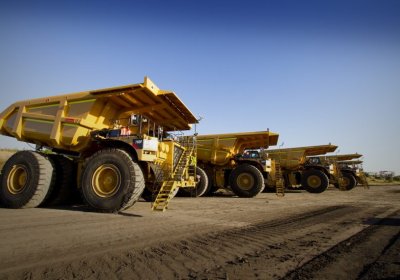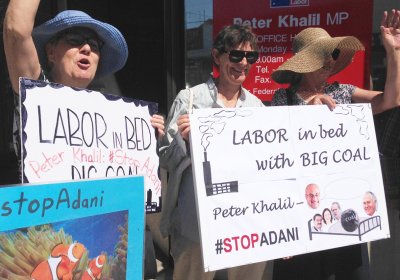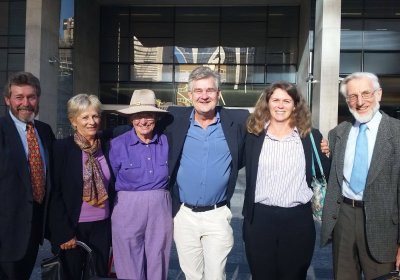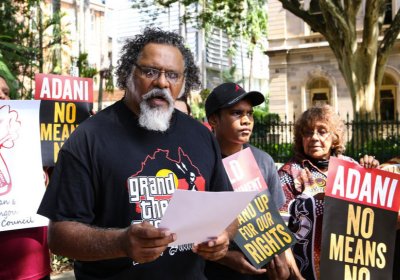A new research report from the Queensland Environmental Defenders Office (EDO) has revealed that any move by the Queensland state government to approve the Acland coalmine expansion would represent an unprecedented and radical departure from recent tradition.
Margaret Gleeson
A noisy group of protesters gathered outside the Australian Infrastructure Investors Forum on September 12 to “welcome” its keynote speaker, the CEO of the Northern Australia Infrastructure Fund (NAIF) Laurie Walker. NAIF Board members are the focus of a campaign by the movement to prevent the massive Adani coalmine in Queensland’s Galilee basin.
Adani lobbyist and former Queensland Labor Party state secretary Cameron Milner, who played a key role in the 2015 election win of Premier Annastacia Palaszczuk, has returned to Labor headquarters.
More than 350 activists participated in the Sydney Stop Adani Summit on September 2.
Participants came from a range of organisations. Some were part of the Stop Adani Alliance, which includes the Bob Brown Foundation, the Australian Conservation Foundation, 350.org, GetUp!, the Australian Youth Climate Coalition, the Seed Indigenous Youth Climate Network, Sea Shepherd and the Australian Marine Conservation Society.
Activists opposing the proposed megamine that Indian miner Adani wants to build in central Queensland have suffered two legal setbacks in their quest to block the mine.
On August 25, the Federal Court dismissed the appeal by the Australian Conservation Foundation against the federal government’s approval of Adani's Carmichael coalmine.
More than 300 unionists and local residents protested outside the electorate office of Liberal MP for Drummoyne John Sidoti on August 4.
Chanting “John Sidoti’s got to go!” and waving placards opposing the NSW government’s planned privatisation of public buses in the Inner West, the protest elicited much support from passing motorists and pedestrians. There was no response, however, from Sidoti’s office.
Flags from the Rail, Tram and Bus Union (RTBU), Australian Manufacturing Workers Union (AMWU) and the Australian Services Union (ASU) were prominent.
Queensland Premier Anastacia Palaszczuk’s 2015 election commitments to transparent decision making, no “secret deals” and that the Adani project must “stand alone on its feet ... on the economics of the project itself” have been challenged by documents released under a Right to Information request.
In launching the report Not so super, for women: Superannuation and women’s retirement outcomes” by David Hetherington and Warwick Smith on July 20, Australian Services Union (ASU) national secretary David Smith said: “Australia’s compulsory superannuation system is failing women. According to the latest figures, women are retiring with around half as much superannuation (53%) as men.”
The Queensland Land Court delivered its judgement on Hancock Galilee’s proposed Kevin’s Corner coalmine on July 4. Hancock Galilee is a wholly owned subsidiary of the GVK Group, which also owns the adjacent Alpha mine.
Land court member Wayne Cochrane determined: “There is no basis upon which I should recommend refusal of the grant of the mining lease, notwithstanding that it will convert otherwise useful grazing land into a coalmine.”
Justice Peter Applegarth of the Supreme Court rejected on June 23 the application by New Acland Coal (NAC) for judicial review of the Queensland Land Court’s decision, which recommended rejecting the Stage 3 expansion of the New Hope Mine. He said he was not satisfied irreparable harm would be caused to New Acland Coal and other third parties if a stay was not ordered.
Environmental approval for the expansion of Adani’s coal port at Abbot Point was ruled lawful in the Queensland Supreme Court on June 15.
Local group Whitsunday Residents Against Dumping (WRAD) had challenged the legality of the Queensland government’s decision to approve the controversial Abbot Point coal terminal expansion in Queensland’s Supreme Court on October 7.
As the celebrations marking 25 years of the Mabo decision died down, the Native Title Amendment (Indigenous Land Use Agreements) Bill 2017 quietly passed in the Senate on June 14, with the only opposition coming from the Greens.
The amending legislation effectively negates the Federal Court ruling of February 2 that all native title claimants had to sign off on an indigenous land use agreement (ILUA) for it to be registered.
- Previous page
- Page 10
- Next page











